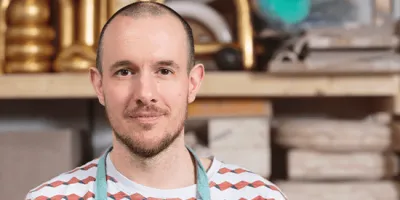

James Rigler
Future Heritage
Information
Clay lies at the heart of the objects that James Rigler makes. It is the material through which he understands the world, helping to mould his ideas and processes before they become fully formed. Clay is an ancient and ubiquitous material in both the domestic and architectural realms, Rigler draws on both to create sculptures and functional forms that change the way we view a familiar place or objects.
Rigler makes pieces that attempt to tread a line between ordinary and extraordinary, function and non-function, the domestic and the monumental. Rooted in traditional clay techniques (particularly industrial processes like slip-casting and press-moulding), he has developed a broad practice encompassing site-specific interventions, unique sculptures, tilework, furniture and lighting. His interest in the sensual qualities of ceramics inspires his glazed and gilded surfaces, with other materials adding to a sense of richness and depth.
Rigler has worked with outstanding historic interiors, such as the Victoria & Albert Museum and Chatsworth, as well as creating sculptural responses for more modest domestic spaces and bespoke editions for retail. He relishes the challenge posed by a new context or by the constraints of function; they prompt new discoveries, drive his work and fuel his passion for making. His love of clay began in the architectural terracotta industry where, as a plaster model-maker and mould-maker, Rigler created ceramic details to replace those missing from historic buildings. Architecture is a game of signs, where material, scale, form and decoration intersect to speak about the importance of a building and what happens within it; by looking more closely, Rigler is often dazzled by the strangeness of familiar architectural languages and styles of decoration.
At Future Heritage
For Future Heritage 2019, Rigler created a series of ceramic objects inspired by the muscular geometry of Olympia’s barrel-vaulted roof. The works were both functional and sculptural, with a decorative gold-leafed surface that transcended their monumental forms. A series of lamps evoked tools or machinery; seating was inspired by fragments of heavy engineering and architectural ornamentation.
At the end of 2019, Rigler installed a major new commission, Primitive Forms, for the newly remodeled Aberdeen Art Gallery. These four large-scale ceramic elements engaged with the architecture of the concert hall foyer, inviting a new interpretation of the decorative language and heritage of the original building. At the same time, he completed three new unique sculptural lamps for MESS, the first ever ceramic survey show by U.S design gallery The Future Perfect, and an editioned lamp for House of Voltaire, London.
Current work
Rigler is currently working on a commission for a Tabernacle for a modernist Gillespie, Kidd & Coia church in Glasgow. He is also creating new pieces for a show at the New Art Centre, Roche Court, a collection of furniture and furnishings inspired by the architectural features of Pollokshields, the UK’s first Garden Suburb; new sculptural ceramic work for Sarah Myerscough Gallery, London.